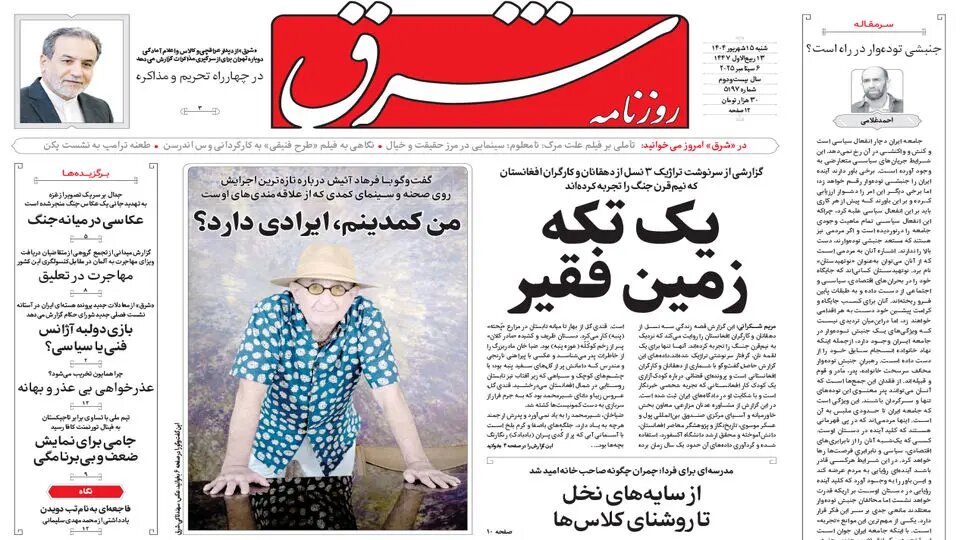The future Board of Governors meeting: the path to a resolution or interaction?

TEHRAN - Shargh analyzed the new reports expected to be released by the International Atomic Energy Agency as well as the political behavior of its director general Rafael Grossi.
It wrote: With only a few days left until the new Board of Governors meeting, all eyes are on Grossi’s behavior and the stance of Western countries. If the mid-June model is repeated, we will likely witness coordinated efforts to issue a censure resolution or apply more diplomatic pressure against Iran. However, some analysts believe that Grossi and his Western supporters are contemplating two approaches: On one hand, by presenting an worrying report and raising new technical claims, they are preparing the ground for more political pressure on Iran; and on the other hand, they are keeping diplomatic channels open so that, if necessary, they can use an agreement or negotiation as a bargaining tool. Overall, the recent behavior of the IAEA Director General and some Western countries shows that the upcoming meeting could be the starting point for a new phase of pressure; a stage in which the Iran nuclear issue will once again be used as a tool for political pressure both regionally and globally. This wrong cycle will continue unless the parties return to the path of technical and professional interactions instead of making media and political hypes.
Etemad: Diplomatic power after the Russian proposal
In an interview with Dr. Majid Mohammad Sharifi, an expert on international affairs, Etemad discussed with him the Russian proposal after the European troika activated the snapback sanctions against Iran. Sharifi said: The act of activating the snapback is more political in nature than it is based on legal arguments. In such circumstances, the success of this action depends on diplomatic power and persuading other countries to join the international sanctions against Iran. The Russian proposal and the arguments put forward by China can also have a legal basis. Similarly, Iran's argument that the European action is illegitimate may also be defensible from a legal point of view. This is especially relevant after the U.S. and Israeli military attacks on Iran’s nuclear facilities. The Russian proposal, while legally sound, is highly dependent on political factors. Russia’s ability to persuade other countries, including China, to disregard international sanctions against Iran appears to be very difficult. Therefore, it is unlikely that Russia will have sufficient diplomatic power to garner broad support from other countries in the face of international sanctions.
Khorassan: Israel and the weapon of terror!
In an analysis, Khorassan analyzed Israel’s behavior in the region and the views of regional government leaders: After Israel attacked Iran in June, this regime will try to use the weapon of terror more extensively at different levels in every future war with Iran, and may wait for ripe conditions to to carry out “major assassinations” and resume war. The act of Israel to start a war against Iran and its fighter jets fly over the skies of the Persian Gulf and Tehran and assassinate senior military officials will make the leaders of the regional countries more cautious towards Tel Aviv and more inactive than ever before. This will push the regional rulers more than ever towards adopting conservative policies and avoiding any risk. On the other hand, if this situation continues, it will give Israel with more opportunities in the region in the future. And if the regime is not controlled or restrained, a major event such as normalization between Israel and other countries will likely occur in the future without any concessions.
Hamshahri: The importance of Araghchi trip to Doha
In a note, Hamshahri discussed the importance of Iranian Foreign Minister Araghchi's trip to Doha, Qatar. The paper said: The recent visit of the Iranian Foreign Minister to Qatar once again demonstrated Tehran's adherence to diplomatic approaches in a situation where the United States and the European troika, with their recent hostile actions, have proven that they not only show commitment to their negotiating slogans, but also create obstacles in this path. The activation of the snapback sanctions by France, Germany, and England and the disclosure of the U.S. government's attempt to impose restrictions on the Iranian delegation during its attendance at the UN General Assembly in New York in the coming days are the latest manifestations of the Western parties' lack of adherence to diplomatic approaches. This is while the U.S. and European governments are trying to throw the nuclear negotiations ball into Iran's court by creating a multifaceted atmosphere. In such a situation, the recent visit of Abbas Araghchi to Qatar was of particular importance in various aspects. Nuclear negotiations with Europe and bilateral relations between Tehran and Doh were among the main topics of the consultations in Qatar.
Leave a Comment